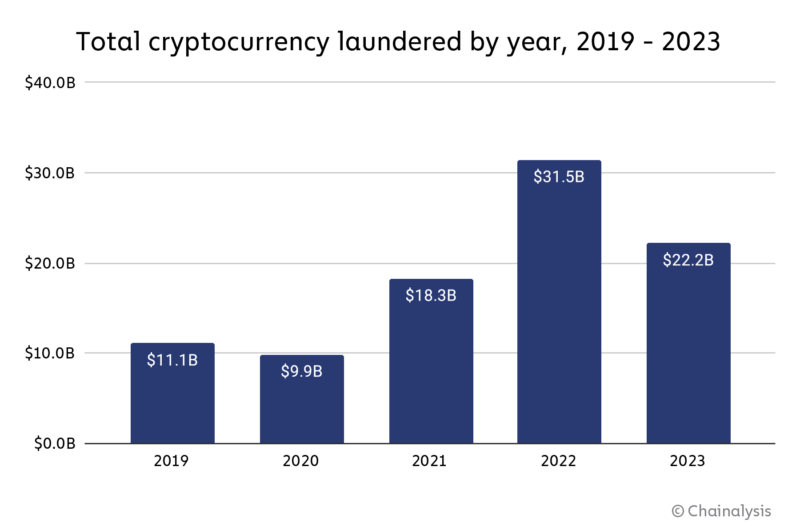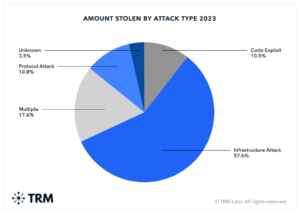In 2023, illicit addresses sent $22.2 billion worth of cryptocurrency to services, which is a significant decrease from the $31.5 billion sent in 2022, an upcoming report by Chainalysis indicates.
“Some of this drop may be attributed to an overall decrease in crypto transaction volume, both legitimate and illicit. However, the drop in money laundering activity was steeper, at 29.5%, compared to the 14.9% drop in total transaction volume,” the Chainalysis 2024 Crypto Crime Report says.
2023 also saw a drop in the value of illicit funds arriving in individual crypto addresses. 109 exchange deposit addresses received over $10 million worth of illicit cryptocurrency each, and collectively, they received $3.4 billion in illicit cryptocurrency. While that still represents significant concentration, in 2022, only 40 addresses received over $10 million in illicit crypto, for a collective total of just under $2.0 billion.
it’s possible that crypto criminals are diversifying their money laundering activity across more nested services or deposit addresses in order to better conceal it from law enforcement and exchange compliance teams. Spreading the activity across more addresses may also be a strategy to lessen the impact of any one deposit address being frozen for suspicious activity
– Chainalysis
In general, centralized exchanges continue to be the main destination for funds sent from illicit addresses, maintaining a relatively stable rate over the past five years, Chainalysis said. However, the role of illicit services has diminished over time, while the proportion of illicit funds directed towards decentralized finance (DeFi) protocols has increased.
“We attribute this, primarily, to the overall growth of DeFi generally during the time period, but must also note that DeFi’s inherent transparency generally makes it a poor choice for obfuscating the movement of funds,” Chainalysis said.
There was a huge increase in the volume of funds sent to cross-chain bridges from addresses associated with stolen funds and a substantial increase in funds sent from ransomware to gambling platforms and in funds sent to bridges from ransomware wallets.
Bridge protocols received $743.8 million in crypto from illicit addresses in 2023, up from just $312.2 million in 2022. North Korea-affiliated hackers have been among those to utilize bridges for money laundering the most.
Chainalysis, which was recently sued over its methods for identifying crypto crime, noted that fiat off-ramping services are important because they’re where criminals can convert their crypto into cash — ‘the culmination of the money laundering process.’
FUNDING | Kenyan Crypto On-Off-Ramp, Kotani Pay, Closes $2 Million Funding Round
Kotani Pay is set to introduce more products including Reconset, a Reconciliation-as-a-Service offering, and Money Ledger, a Ledger-as-a-Service solution, after acquiring Fuhlstack, a Nigerian… pic.twitter.com/FsW4JJRe6v
— BitKE (@BitcoinKE) September 6, 2023
Most money laundering activity is concentrated on a select few fiat off-ramp services. Of all illicit funds sent to off-ramping services in 2023, 71.7% went to just five services, up slightly from 68.7% in 2022.
Follow us on Twitter for latest posts and updates
Join and interact with our Telegram community
_______________________________________
_______________________________________


